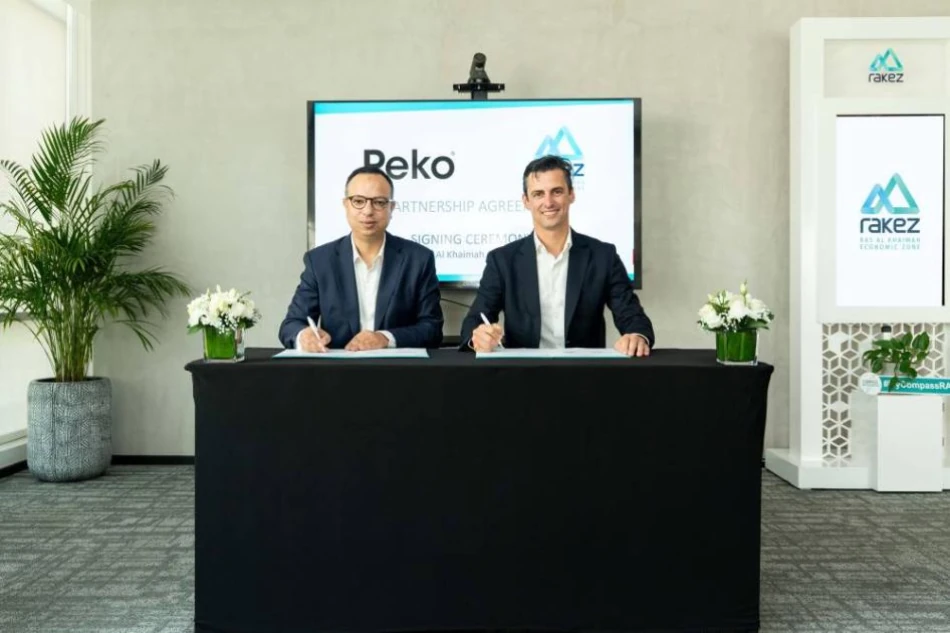
Rakez Unveils Cutting-Edge Digital Solutions for Small and Medium Enterprises
UAE's Ras Al Khaimah Economic Zone Partners with Fintech Startup to Digitize SME Operations
The Ras Al Khaimah Economic Zone Authority (RAKEZ) has forged a strategic partnership with UAE fintech company Pico to deliver automated business services through its digital platform, marking another step in the Emirates' broader push to position itself as a regional hub for digital commerce and financial innovation. The collaboration will provide small and medium enterprises with streamlined access to invoicing, payroll processing, utility payments, and business travel bookings.
Digital Infrastructure Push Accelerates
The memorandum of understanding, signed by Pico founder and CEO Kashif Khan and RAKEZ Customer Experience Director Ian Hunt at the Compass Business Center, reflects the UAE's systematic approach to building comprehensive digital business ecosystems. Unlike piecemeal digitization efforts seen elsewhere in the region, this partnership integrates multiple operational functions into a single platform accessible through RAKEZ's electronic services portal.
This move aligns with the UAE's broader UAE Vision 2071 strategy, which aims to make the country the world's best nation by its centennial through technological advancement and economic diversification. The partnership specifically targets operational pain points that typically consume significant time and resources for smaller businesses.
Strategic Positioning Against Regional Competitors
The RAKEZ-Pico partnership comes as Gulf states intensify competition for business registration and operational services. Saudi Arabia's NEOM project and Qatar's financial center initiatives have raised the stakes for attracting international businesses, particularly in the fintech and digital services sectors.
Market Differentiation Through Integration
What sets this partnership apart from similar initiatives in Dubai International Financial Centre or Abu Dhabi Global Market is its focus on operational automation rather than just regulatory facilitation. By embedding fintech services directly into the economic zone's infrastructure, RAKEZ is essentially offering a "business-in-a-box" solution that could prove attractive to international companies seeking streamlined Middle East operations.
SME Market Implications
The timing is particularly significant given the UAE's SME sector comprises over 94% of all companies in the country and contributes approximately 70% to GDP. However, many of these businesses still rely on manual processes for routine operations, creating inefficiencies that can limit growth potential.
"We're not just addressing operational challenges, but reshaping what's possible for this category of companies," Khan stated, suggesting the partnership aims to establish new benchmarks for SME operations in modern economies.
Competitive Advantage for Smaller Players
The automated services could level the playing field between SMEs and larger corporations that typically have dedicated departments for payroll, invoicing, and travel management. This democratization of business infrastructure mirrors successful models in Singapore's Smart Nation initiative and Estonia's e-Residency program, both of which have attracted significant international business registration.
Investor and Market Outlook
For fintech investors, the partnership represents validation of the UAE's commitment to supporting homegrown financial technology companies. Pico's integration with a major economic zone authority provides the kind of institutional backing that can accelerate user adoption and revenue growth.
The broader implications extend to the UAE's position in the global fintech landscape. While the country has made significant strides in cryptocurrency regulation and digital banking, operational fintech solutions for SMEs represent a potentially larger and more stable market than consumer-focused applications.
RAKEZ CEO Rami Jallad emphasized that enabling clients to "conduct business smoothly and efficiently" remains a core priority, suggesting this partnership may serve as a template for similar collaborations across other UAE economic zones and potentially throughout the GCC region.
Most Viewed News

 Omar Rahman
Omar Rahman






